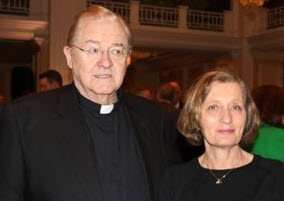Tuesday, September 17, 2024
IRISH CONGRESSIONAL BRIEFING
Distributed to Congress by Irish National Caucus
“COULD THIS HAVE BEEN ANOTHER ONE OF ENGLAND’S INFAMOUS COVER-UPS?”—Fr. Sean McManus.
Was Shakespeare a Catholic? Here’s the evidence (Photos)
Shakespeare’s plays bear witness to how Catholicism infused his imagination, but there is also tangible evidence that he lived as a Catholic.
Joseph Pearce. Aleteia .September 17, 2024.
Could the most famous writer in history have been a Catholic? G.K. Chesterton thought so, stating that Shakespeare’s Catholicism was “supported by the few external and political facts we know.” St. John Henry Newman also thought so. Shakespeare “has so little of a Protestant about him,” Newman wrote, “that Catholics have been able, without extravagance, to claim him as their own.” Hilaire Belloc, echoing the verdict of Chesterton and Newman, insisted that “the plays of Shakespeare were written by a man plainly Catholic in habit of mind.” In recent decades, solid historical scholarship has added significantly to the “few external and political facts” known by Chesterton, Newman and Belloc.
The investigation of Shakespeare’s life begins with the overwhelming evidence that he was raised in a devoutly and even a defiantly Catholic family. The poet’s father hid a document, “a spiritual will,” in the roof of the family home in which he affirmed his Catholic faith. He would also be fined in 1592 for his “recusancy,” his refusal, in conscience, to attend Anglican services as was compulsory under England’s tyrannically anti-Catholic laws. Meanwhile, Shakespeare’s mother’s family was one of the most incorrigibly defiant Catholic families in the whole of England.
View the PHOTO GALLERY at the end of this article to see the evidence for Shakespeare’s Catholicism.
Catholic friends and associates
As for Shakespeare himself, there is evidence that he might have spent some time as a schoolmaster in a Catholic home in Lancashire in his youth, and there is also evidence that he was forced to leave his hometown of Stratford because he had made an enemy of Sir Thomas Lucy, a notorious persecutor of Catholics.
In London, Shakespeare’s patron, the Earl of Southampton, was a well-known Catholic, from a staunchly Catholic family, who had the Jesuit, St. Robert Southwell, as his confessor. There is considerable documentary evidence to show that Shakespeare and Southwell were acquainted before the latter’s arrest in 1592. Southwell was tortured repeatedly during his imprisonment and would be hanged, drawn and quartered at the Tyburn gallows in 1595. He would later be canonized as one of the Forty Martyrs of England and Wales.
If Shakespeare counted priests among his friends, we know that he counted those who persecuted Catholics among his enemies. Court records show that he found himself embroiled in a legal dispute with William Gardiner, who had accused him of threatening physical violence. Gardiner’s virulent anti-Catholicism has been preserved for posterity in a report that he sent to Queen Elizabeth’s Privy Council, documenting a raid on a Catholic home in London. This document exhibits Gardiner’s vehement disapproval of “papistry” and gives an invaluable insight into the sort of man whom Shakespeare considered to be his enemy.
Blackfriars Gatehouse
One of the most convincing pieces of evidence for Shakespeare’s Catholicism is to be found in his purchase of the Blackfriars Gatehouse in March 1613. This house was “a notorious center of Catholic activities,” which had “sundry backdoors and bye-ways, and many secret vaults and corners” and had been “in time past suspected and searched for papists.” In 1598, acting on a report that the Gatehouse was a hive of recusant activity which had “many places of secret conveyance in it” and “secret passages towards the water,” i.e. towards the river Thames from whence priests could make their getaway, the authorities raided the house.
In 1605, the Jesuit, John Gerard, the most wanted man in England, appeared in desperation at the Gatehouse, wearing a wig and false beard as a disguise, and asking for shelter, stating that he did not know where else to hide. As late as 1610 it was reported that the Gatehouse was the base for Jesuits plotting to kill the king.
Shakespeare, having chosen to purchase one of the most notorious Catholic houses in the whole of England, leased it to John Robinson, an active Catholic whose brother had entered the English College in Rome to train for the priesthood. As Ian Wilson surmised in Shakespeare: The Evidence, Robinson was “not so much Shakespeare’s tenant in the Gatehouse, as his appointed guardian of one of London’s best places of refuge for Catholic priests.”He was also a valued friend who visited Shakespeare in Stratford during the Poet’s retirement and was present during Shakespeare’s final illness, signing his will as a witness.
A recusant daughter
Upon his death, Shakespeare left the bulk of his wealth to his daughter Susanna, who had been listed as a recusant Catholic ten years earlier. Other beneficiaries of his will included several of his recusant Catholic friends. It is clear, therefore, as the Anglican clergyman Richard Davies lamented, in the late 1600s, that “he dyed a papist.” It is equally clear that he lived as a papist, a fact that the English did their best to ignore or hide in the centuries after his death, and a fact that many literary critics are still trying to deny.
As for those who share Shakespeare’s Catholic faith, it is a source of great joy to know that this greatest of writers is on the side of the angels.
Click on the Slideshow below to see the evidence for Shakespeare’s Catholicism.
Joseph Pearce is the author of The Quest for Shakespeare: The Bard of Avon and the Church of Rome and Through Shakespeare’s Eyes: Seeing the Catholic Presence in the Plays.






